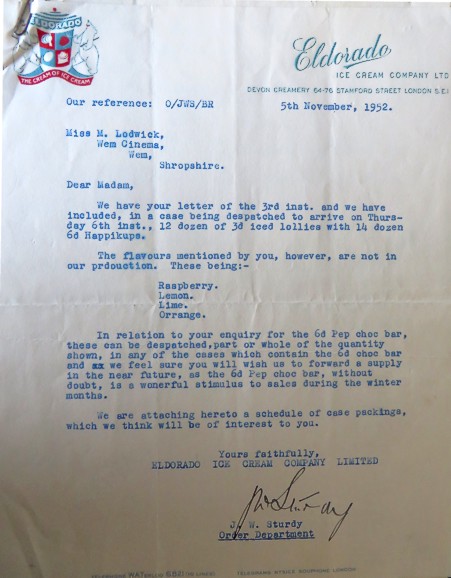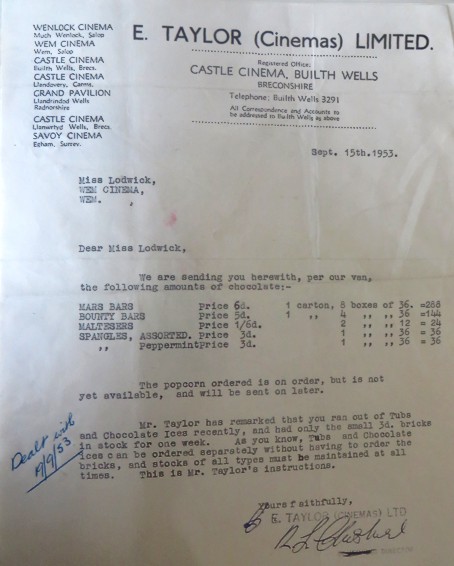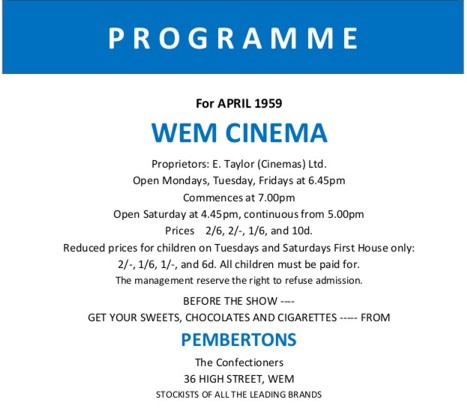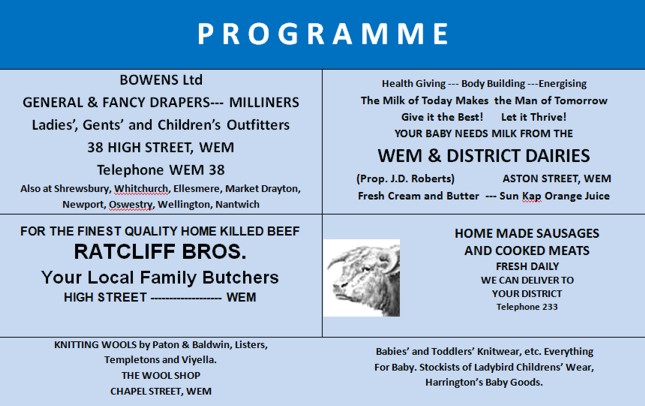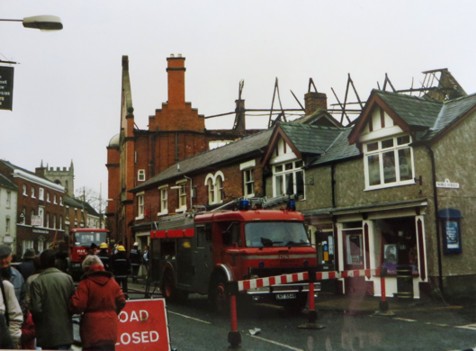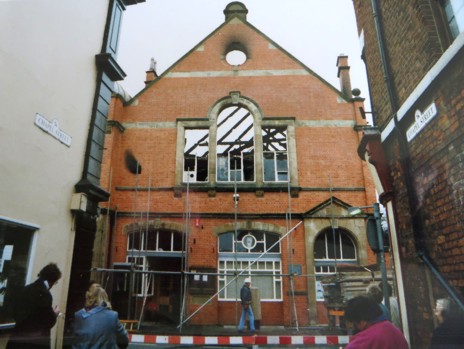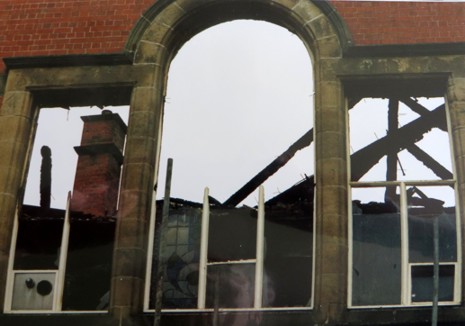With thanks to Sue Robinson for allowing access to her collection of material relating to Wem Cinema.
Information about early cinemas is sparse. The first screening is reckoned to be that held at the Polytechnic in Upper Regent Street, London in 1896. The programme was made up of short films from the French Lumière brothers. Travelling fairs hired local halls for special shows, and music halls included films in their programmes. When businessmen realised that this was no ‘flash in the pan’, buildings began to be converted into cinemas. The conversion was fairly crude, often with just a whitewashed wall and boarded up windows. Government concern about public safety (the nitrate film used is highly inflammable) led to new regulations following the Cinematograph Act of 1909. This encouraged the spread of purpose-built cinemas.
Records show that in the early 1900s, the Cheshire Animated Picture Co. presented occasional screenings in Wem Town Hall. The nightly Picture Palace in the White Horse Assembly Rooms followed with shows from 7.00pm to 10.30pm; children's matinees took place on Saturday afternoons and admission was 3d or 6d. Activity moved back to the Town Hall with the Picture Drome by 1913 with screenings from Thursdays to Saturdays. Prices had risen, now being 3d to 1/-, with children's matinees at 2d and 3d.
There was a rapid expansion of theatres and companies in this period. The 1914 edition of the Kinematograph Year Book (KYB) shows:
- Shrewsbury with the Central Hall at Castle Gates, seating 650, run by Glynn Hill & Co; the Picture House, seating 700, run by Cinema Theatres Midlands Ltd., and the Theatre Royal & Hippodrome, run by W. Yates Gregory;
- Ellesmere, the Goulding Cinema Co. operated in Trimpley Hall;
- Llandrindod Wells, a 500-seater in the King Theatre ran by GM Hand.
- Wrexham Hippodrome Ltd. was also established for cinema operations.
As a new and popular entertainment for the masses, Cinema soon came under the scrutiny of the National Council of Public Morals. Fears were expressed but it was judged a lesser evil than the public house. Soon feature length films replaced the shorts.
Small regional circuits started to develop.
- 1931, the KYB shows Wem Cinema still in the Town Hall being run by Cambrian & Border Cinemas Ltd. of Wrexham. The Much Wenlock cinema was in the Memorial Hall with a nightly screening on Friday & Saturday from September to April operated by Walter Woof of Waljalen Cinema.
- 1933 Wem Cinema was still operating, Much Wenlock was closed but there were two cinemas in Whitchurch, the Grand and the Palladium, operated by TE Markham, of Ye Olde Wych Theatre (Nantwich).
- 1936, Wem was being run by Cosy Cinemas (Dawley) Ltd. with prices from 3d to 1/3. [400 seats; proscenium 18’ wide and dance hall.]
- 1935 Much Wenlock's cinema was again operating in the Memorial Hall with seating for 250, offering two performances nightly across four days.
It used Gyrotone, an early sound system. The proprietor was Edward V. Taylor, who was born in Stratford on Avon, the son of
wooden patternmaker from Leicesterson, John Henry,from Leicester, and Annie, from Northampton. He was listed as an electrical & radio dealer in Much Wenlock (1939).
He died in 1957 in Shirley, Warwickshire.
In the early 1940s, the chain's HQ moved from Much Wenlock to Builth Wells.
The cinema chain in the late 1930s/early 1940s, consisted of:- Castle Cinema, Builth Wells
- Castle Cinema, Llandovery
- Castle Cinema, Rhayader, Radnorshire
- Castle Cinema, Llanwrytd Wells, Brecs
- Farndon Cinema, Cheshire.
- Grand Pavilion Cinema, Llandrindod Wells, Radnorshire
- Plaza Cinema, Newent, Gloucs.
- Savoy Cinema, Egham, Surrey
- Wenlock Cinema, Much Wenlock
- Wem Cinema, Wem
The cinemas are shown on the map below. The inclusion of the Savoy Cinema in Egham is unexplained.
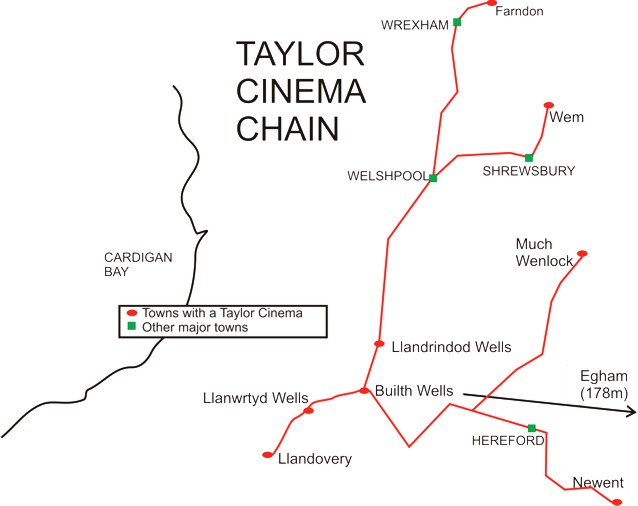
Few of these cinemas survive.
Grand Pavilion in Llandrindod Wells
Summer entertainments in Llandrindod Wells had been provided in temporary marquees at the Rock Park.
Then the Grand Pavilion was built there in 1912 at a cost of ¤4,750 as a concert hall, dance hall and theatre. Originally there was a balcony all the way around the building, which was used by
Lord Baden-Powell when he gave a speech to a Scout Jamboree in 1933.
Our thanks to historypoints.org for the additional information.
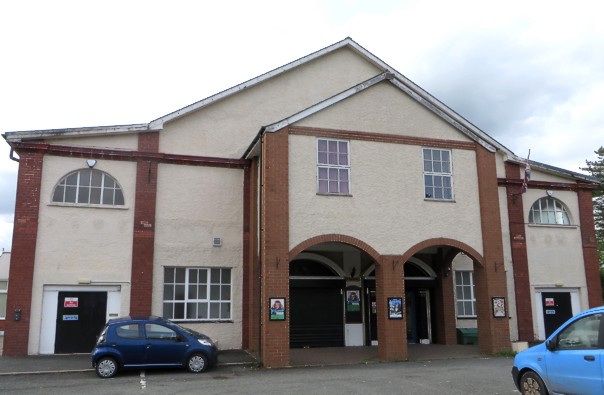
During the First World War, whist drives were held at the Grand Pavilion to raise funds for the Blue Cross, which cared for animals in military service. The army still depended on horses for heavy transport.
Dogs served at the front in many capacities. The pavilion was also used for lectures by the Royal Army Medical Corps. More than 2,000 men, mostly from the RAMC, packed into the pavilion in March 1915 for a RAMC
boxing tournament. Concerts given in the Grand Pavilion by RAMC men were popular. The RAMC's farewell concert, held here in May 1916, drew a large audience.
The pavilion functioned as a cinema (900 seats) from the 1920s to the 1950s. During the 1930s and 1940s, as part of the Taylor chain and at other times it was run by the Welsh chain of Paramount Picture Theatres
and by Whale Cinemas.
Later it was primarily a dance hall. Powys County Council ran the pavilion from the 1970s until 2015 as a venue for conferences, discos, comedy and other events. The building was refurbished in 1994 by the
Town Council. In 2015 it was closed and the County Council put the building and the grounds that surround it up for sale. In March 2016, Grand Pavilion Events,
a community interest company, reopened the building as a venue for public hire and entertainments. The image shows that main hall still has the appearance of a cinema
(minus the seating) and we were told that the stage was well suited to Welsh male voice choirs.
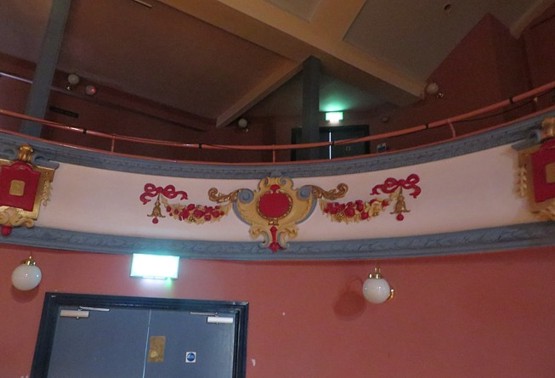
Plasterwork, a reminder of the heydays for cinemas and theatres.
The main hall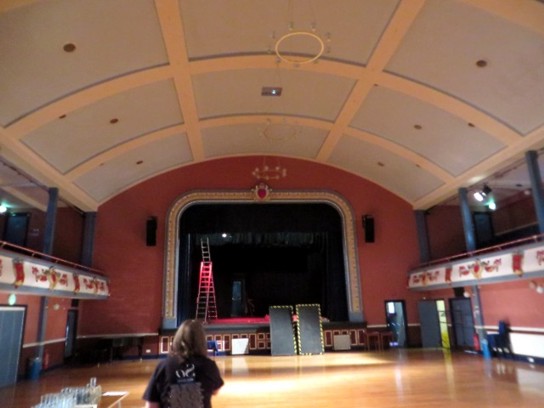
During the Taylor period, a number of local people worked for the cinema.
Employees:
- Hilda DROMGOOL
- Dorothy GERMAN
- Hubert HOULDING
- William JONES
- Daisy LODWICK
- Frederick LODWICK
- Mary LODWICK
- Gwen MILLER
- Kenneth RATCLIFF
- Sylvia RATCLIFF
- John ROBERTS
Small regional cinemas usually took the 2nd and 3rd runs of films after the major national chains, ABC, Gaumont, Odeon, took the 1st runs. There was a 'quota' that required distributors to take a number of British
films. Small regional chains would sometimes take up the slack. 1959's playlist also shows that the cinema was screening recent films: ‘Carry On Sergeant’ with William Hartnell [the first Dr Who], Bob Monkhouse (1958);
"The Duke Wore Jeans" with Tommy Steele, June Laverick (1958); "Gideon's Day" with Jack Hawkins, Dianne Foster (1958); "The Deep Six" with Alan Ladd, Dianne Foster (1958).
Enough patrons were coming from the villages for film adverts to be placed at a number of sites. Bills were posted from Cockshutt to Prees Green, from Stanton on Hine Heath to Steel Heath. There were numerous sites in town,
Co-op Stores (Station Rd.), Obertelli's Fish Shop (New St.), Maund Cycle Stores (High St.), the Vine Vaults and many more.
Advertising sites for Cinema Posters (Wem):
